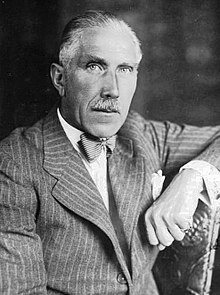Franz von Papen
| Franz von Papen | |
|---|---|

Von Papen in 1936
|
|
| Germany Ambassador to Turkey | |
|
In office 30 April 1939 – 1 August 1944 |
|
| Chancellor | Adolf Hitler |
| Preceded by | Friedrich von Keller |
| Succeeded by | Wilhelm Haas (1952) |
| Germany Ambassador to Austria | |
|
In office 7 August 1934 – 12 March 1938 |
|
| Chancellor | Adolf Hitler |
| Preceded by | Kurt Rieth |
| Succeeded by | None (Anschluss) Carl-Hermann Mueller-Graaf (1952) |
| Vice-Chancellor of Germany | |
|
In office 30 January 1933 – 7 August 1934 |
|
| Chancellor | Adolf Hitler |
| Preceded by | Hermann R. Dietrich |
| Succeeded by | Hermann Göring (1941) |
| Minister President of Prussia | |
|
In office 30 January 1933 – 10 April 1933 |
|
| Preceded by | Kurt von Schleicher |
| Succeeded by | Hermann Göring |
|
In office 20 July 1932 – 3 December 1932 |
|
| Preceded by | Otto Braun |
| Succeeded by | Kurt von Schleicher |
| 22nd Chancellor of Germany | |
|
In office 1 June 1932 – 17 November 1932 |
|
| President | Paul von Hindenburg |
| Preceded by | Heinrich Brüning |
| Succeeded by | Kurt von Schleicher |
| Personal details | |
| Born |
Franz Joseph Hermann Michael Maria von Papen zu Köningen 29 October 1879 Werl, Germany |
| Died | 2 May 1969 (aged 89) Obersasbach, West Germany |
| Resting place | Wallerfangen, Germany |
| Political party |
Zentrum (1918–1932) Independent (1932–1945) |
| Spouse(s) | Martha von Boch-Galhau (m. 1905; her d. 1961) |
| Children | Friedrich Antoinette Isabella Margaret Stephanie |
| Alma mater | Prussian Military Academy |
| Profession | Diplomat, military officer |
| Religion | Roman Catholicism |
| Military service | |
| Allegiance |
|
| Rank |
Major Military attaché |
| Battles/wars | World War I |
Franz Joseph Hermann Michael Maria von Papen zu Köningen (German: [ˈfʁants fɔn ˈpaːpən]; 29 October 1879 – 2 May 1969) was a German nobleman, General Staff officer and politician. He served as Chancellor of Germany in 1932 and as Vice-Chancellor under Adolf Hitler in 1933–34. He belonged to the group of close advisers to President Paul von Hindenburg in the late Weimar Republic. It was largely Papen, believing that Hitler could be controlled once he was in the government, who persuaded Hindenburg to appoint Hitler as Chancellor in a cabinet not under Nazi Party domination. However, Papen and his allies were quickly marginalized by Hitler and he left the government after the Night of the Long Knives, during which some of his confidantes were killed by the Nazis.
Born into a wealthy and noble Roman Catholic family in Werl, Westphalia, the son of Friedrich von Papen zu Köningen (1839–1906) and his wife Anna Laura von Steffens (1852–1939), Papen was trained as an army officer. An excellent horseman and man of much charm, Papen cut a dashing figure and during this time, made the fateful friendship with Kurt von Schleicher who become one of his best friends. He served for a period as a military attendant in the Kaiser's Palace, before joining the German General Staff in March 1913. He entered the diplomatic service in December 1913 as a military attaché to the German ambassador in the United States. In early 1914 he travelled to Mexico (to which he was also accredited) and observed the Mexican Revolution, returning to Washington, D.C. in August of that year on the outbreak of the First World War. He had married Martha von Boch-Galhau (1880–1961) on 3 May 1905. Papen's wife was the daughter of a wealthy Saarland industrialist whose dowry made him a very rich man. Fluent in both French and English, Papen traveled widely all over Europe, the Middle East and North America.
...
Wikipedia
